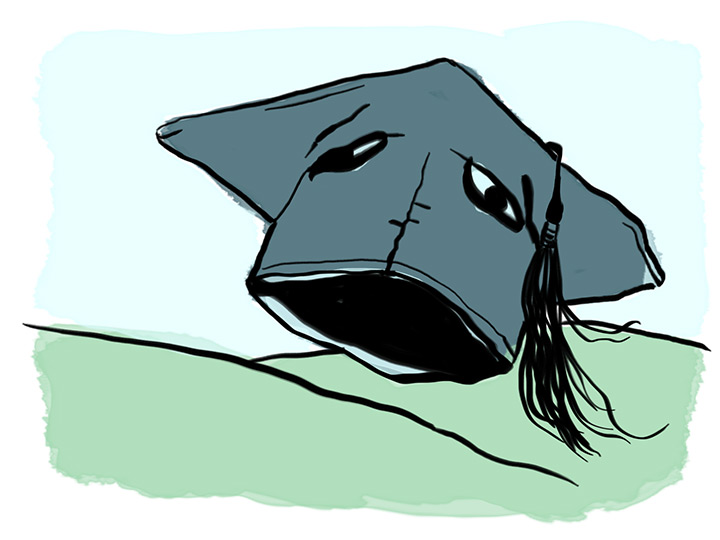How-to advice for the anxious and confident alike

If you’re lucky enough to have only a few exams standing between yourself and graduation, let me be the first to congratulate you. If that prospect both thrills and terrifies you, don’t worry: it’s normal. Finishing your undergraduate degree can be the most backhanded of successes; walking across that stage is the equivalent of a friendly handshake followed by a whispered threat.
Graduation is a bit passive aggressive, sure, but when that fancy piece of paper whispers “now what?” you’ll need to have an answer. You’re not going to take lip from Latin script, are you? The answer is no, so let’s look at two common fears of life after undergrad.
Fear number one is that after so much time and money, all you leave with is a useless piece of paper. In order to avoid the depths of despair, you’ll need to think about your degree properly. It is a piece of paper but, thankfully, it’s also so much more. Don’t get too excited yet though, because your degree doesn’t owe you anything either. As students, we can be tricked into thinking of university as a transaction: time and money go in; dream jobs and success come out—I blame microwave ovens for this expectation. The truth is that an education holds a lot of value, but not all of it is economic value.
The takeaway here? Your degree neither makes nor defines you, but it should shape you. I have a BA in history and haven’t done a single historical thing since I received it in 2012, so is my degree useless? Professor Alison Rowley once told my class that her job was to ensure that when we watched the evening news, we would yell at the T.V. Three years after graduation, I yell, tweet at journalists, and gesture aggressively while watching the news.
Nobody pays me to be upset with the status quo, but I’ll stew in my discontent nonetheless. Why? Because according to Professor Rowley, it means I left Concordia knowing how to think.
Fear number two is that you won’t be able to find a job in your field after graduation. While it’s true that there’s correlation between a university education and getting a job, it’s not the straight line of causation, and many departments don’t groom you for a specific job anyway. Take history as an example. I can tell you that the Battle of Hastings was fought in 1066 and that the Bastille was stormed in 1789, but that’s not a marketable skill. Unless you studied applied sciences or business, chances are recruiters aren’t lining up to hire you, but fear not young graduate! You’ve likely accumulated a stack of skills, such as writing, analytical reading, research (everyone can Google, but you can Google-Fu), and the priceless, unquantifiable art of critical thinking.
Your most important skill, though, is without a doubt your hard-earned ability to meet deadlines and work hard. Unglamorous, I know, but that’s what an arts and sciences degree on a CV really tells potential employers, doubly so if you managed to keep that judgmental GPA above 3.0. If you think about it, you’re probably shortchanging yourself if you limit yourself to your field of undergraduate study. English majors can do more than discuss Byron and Shelley and (thankfully) history majors can do things like work for charities, teach English as a second language, and dream of becoming journalists. Besides, nobody wants to be reminded what year the Magna Carta was signed.
Turning students into citizens with the ability to process information, weigh arguments, and contribute to society is essentially the job of higher education, and when you couple that with a youthful desire to change the world, well, that looks like the future to me.
Hopefully I’ve persuaded you to approach life after graduation with a bit more confidence, but if I’ve filled your heart with fears you hadn’t considered, don’t worry. At the very least you’ve soaked up some of these skills by osmosis. The point is that things won’t be easy, but you have a better chance than most, so make the most of it.
Whether you’re a liberal arts student or an engineer, we all want to build something that doesn’t fall down. Start building, newly-grads.



